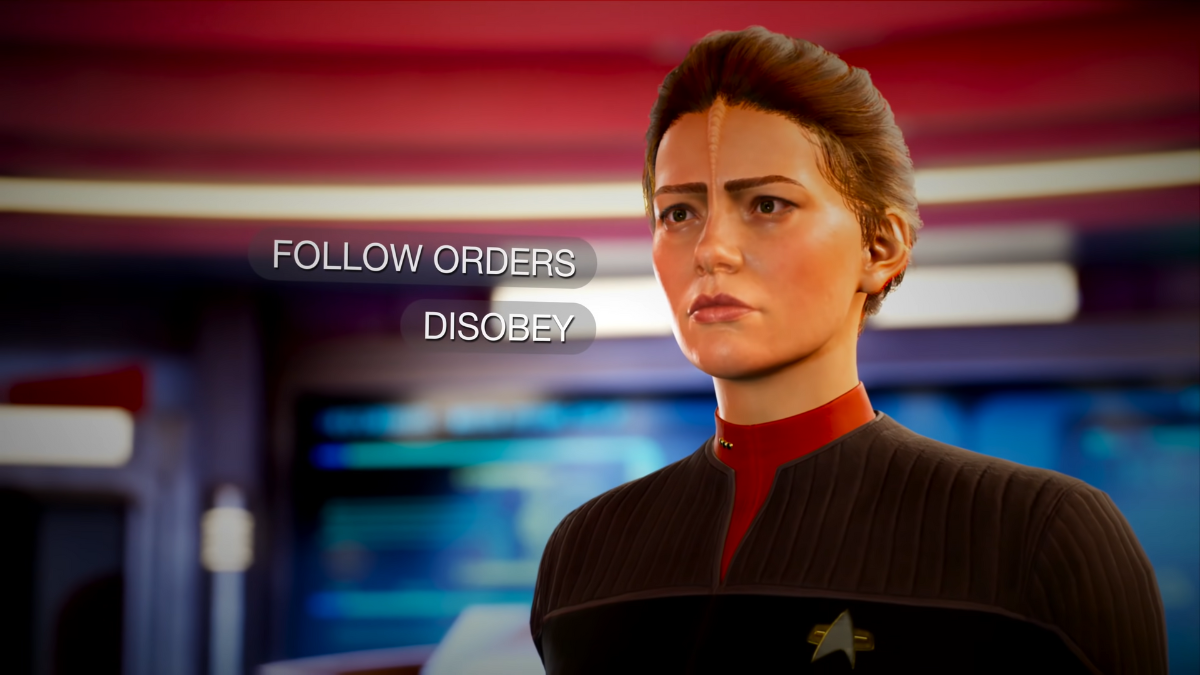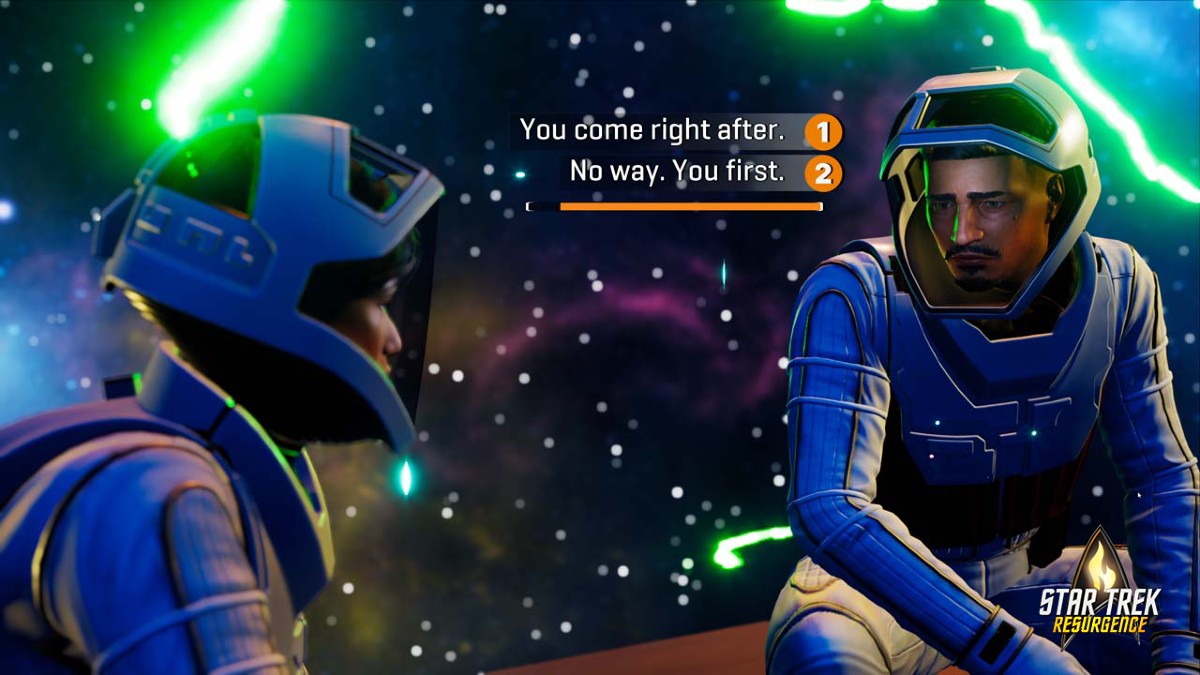In the medium of video games, choice is imperative. The freedom of interactivity is one of the defining characteristics of the art-form — players control, the game follows. Even in the most rigid games, the option to not play, not experience the narrative, or not engage with the systems are available. In-game choice, however, is more complex; developers must account for all possible permutations of any given choice — those who choose it, those who choose the secondary, those who ignore it completely. Keep adding inflection points and the necessary scripted events grow exponentially out of control. Unless you’re Telltale, that is.
It’s impossible to discuss the choice-based adventure game without mentioning Telltale: the California-based developer redefined the point-and-click genre with its integration of difficult, heart-wrenching decisions. While its earlier games, particularly Back to the Future: The Game, attempted to draw players in with dynamic actions and simple choices, it wasn’t until the release of The Walking Dead — an adaptation of Robert Kirkman’s comic of the same name, not affiliated with the TV series — that choice truly mattered to players. Now, every single decision felt like life or death: Do you kill someone who’s infected, or chop off their limb? Do you give someone medication, or food, or a weapon — and can you trust them? The narrative themes fit perfectly with this style of gameplay, in turn helping propel the style to untold heights. Telltale became a high-profile AAA studio that created must-play adventures, and other games — even Uncharted 4: A Thief’s End, an action-adventure blockbuster — felt the need to integrate basic choices for no reason.
While it felt infinite at the moment, Telltale’s reign spanned only a few years, from 2012 until the studio laid off a majority of its staff and inevitably shut down in 2018. There’s a lot more to discuss, particularly the studio’s horrendous treatment of employees, particularly of those it suddenly and unfairly let go, which led to a lawsuit. As of writing, the company is back — it was purchased by LCG Entertainment in 2019 and has attempted to return to the limelight with The Wolf Among Us 2. Since Telltale’s implosion, some employees went to Skybound Games, who finished development on the concluding episode of The Walking Dead: The Final Season.

Other employees — mainly five white dudes — founded Dramatic Labs, an “independent collaboration of writers, developers, designers, artists, and producers who are passionate about the future of interactive storytelling” who are releasing Star Trek: Resurgence next week. That game in the article’s title? Yeah, I’m finally talking about it. If you didn’t know there was a Star Trek video game being developed, let alone that it releases so soon, you aren’t alone. The game — which was originally supposed to come out last spring — spontaneously was given a release date in April. Despite being created with Unreal 5, it’s got the same chunky cel-art style of Telltale games, the same slightly jank-looking aiming reticle, and the same promise to revolutionize interactive adventure games. What the people at Dramatic Labs don’t seem to be aware of, though, is that their style of game actually isn’t the future of interactive adventure games. Not anymore.
Since Telltale’s shutdown in 2018, their slow, methodical wandering of yore has been superseded by dynamic, heart-pounding systems. Since its acclaimed release of Until Dawn in 2015, Supermassive Games has merged the realm of horror fiction with interactive dilemmas. While every game isn’t a masterpiece, they are almost always wildly entertaining and fun to play, using horror tropes to their advantage to create tense moments of life-or-death choices. It may be a slow slog of exploring the area and trying to keep everyone (anticlimactically) alive, but it’s when you try and horribly fail that these games come alive.
While we are (rightfully) ignoring David Cage in this conversation, former Quantic Dream employee Caroline Marchal created the studio INTERIOR/NIGHT and released As Dusk Falls, a sprawling choice-based adventure game, last year. Although it’s not perfect, the game leaned hard into decision-making while stripping away the gameplay, allowing for dozens of impactful decisions per chapter; it felt like a choose-your-own-adventure novel that was impossible to ever read the same way someone else did.

The most monumental changes to the genre, however, aren’t about massive, flashpoint decisions: it’s all about the tiny ones. Deck Nine understood this when developing Life is Strange: True Colors, the newest entry in the long-running choice-based adventure series. While the original games were directly influenced by Telltale, the newest entry bundled all the episodes into one package from the jump and allowed players to explore the town of Haven Springs, Colorado. Big decisions do exist, particularly in reference to which love interest main character Alex Chen chases, but it’s while exploring that the smaller ones come into play: Do you help a character with dementia slowly come to terms with her diagnosis? Do you help her granddaughter gain the courage to leave town for a better life? Do you see through the town jolly-man’s exterior and help soothe his broken heart? Most of these moments are intimate and small — offering a dance, starting a conversation, letting someone know their anger is okay — and seemingly never intersect with the main plot. They do, though, as a final confrontation unites all the townsfolk into trusting you or running you out of town. In one fell swoop, these tiny, organic interactions dovetail into a meaningful conclusion.
The underappreciated Guardians of the Galaxy game by Eidos-Montreal — not at all connected with Telltale’s own attempt at a narrative of the same characters — acts in a very similar way: A few major decisions are bolstered by dozens of smaller ones that players must seek out and engage with on their own terms. As a narrative based around team bonding and fully uniting the found family, these optional interactions — sometimes for something as small as heading in an alternate direction while talking with a character — make the game feel alive. By the end of the story, everyone was united not for plot reasons, but because I personally made them feel loved, cared for, and appreciated.
None of this is to slam Star Trek: Resurgence before it comes out; it’s possible that the game meaningfully innovates on the old Telltale formula unlike Gearbox’s recent New Tales from the Borderlands, itself a successor to a beloved Telltale series. Choice matters, but it isn’t enough to simply present options and call it a day. That novelty is long gone. Instead of trying to rehash the past and become a novelty from a bygone era, it should take a page from Star Trek’s book and go boldly where no game has gone before.











Published: May 16, 2023 05:03 pm